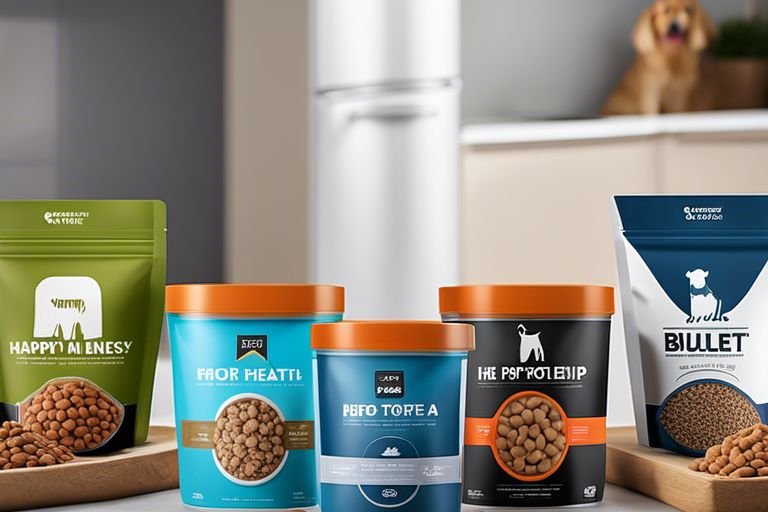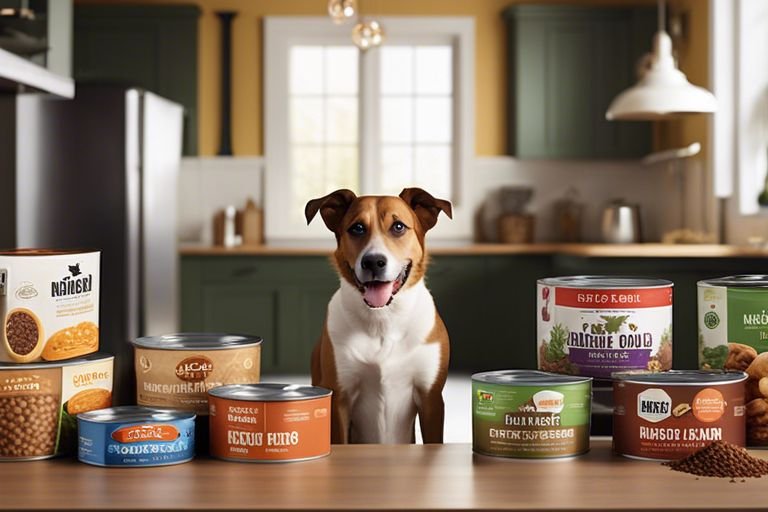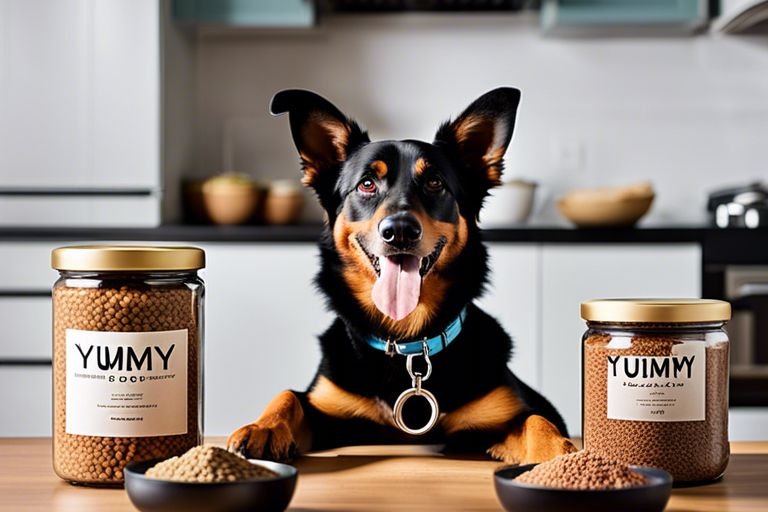
It’s crucial to understand that your furry friend’s nutrition plays a vital role in their overall health and well-being. By incorporating the right additives into their diet, you can enhance their nutrition and help them thrive. In this article, we will explore the top 10 dog food additives that can provide imperative nutrients and improve your pet’s quality of life.
Key Takeaways:
- Omega-3 Fatty Acids: Help support your dog’s skin, coat, and joint health.
- Probiotics: Aid in digestion and improve gut health for your pet.
- Antioxidants: Protect your dog’s cells from damage and boost the immune system.
- Glucosamine: Supports joint health and can help alleviate arthritis symptoms in dogs.
- Prebiotics: Assist in promoting the growth of beneficial bacteria in your dog’s gut.

The Importance of Dog Food Additives
Before we look into the top additives that can enhance your pet’s nutrition, let’s understand why these additives are crucial for your dog’s health and well-being.
Why Commercial Dog Food May Not Be Enough
Any pet owner knows that choosing the right food for your furry friend can be overwhelming. While commercial dog food may provide the basic nutrients your dog needs to survive, it may not always be enough to thrive. Many commercial dog foods contain fillers, additives, and low-quality ingredients that may not meet your dog’s specific nutritional requirements.
The Role of Additives in Enhancing Nutrition
The addition of specific nutrients, vitamins, and minerals to your dog’s food can play a vital role in enhancing their overall health and longevity. These additives can help address specific health concerns, such as joint health, skin and coat condition, digestive health, and immune system support.
The right combination of additives can ensure that your dog is receiving a well-balanced diet tailored to their individual needs, helping them live a happier and healthier life.
Commercial
Commercial dog foods often undergo extensive processing, which can strip away imperative nutrients and enzymes needed for optimal health. By adding specific nutrients and additives back into your dog’s diet, you can help compensate for any deficiencies caused by the manufacturing process and ensure your furry friend is getting the best possible nutrition.
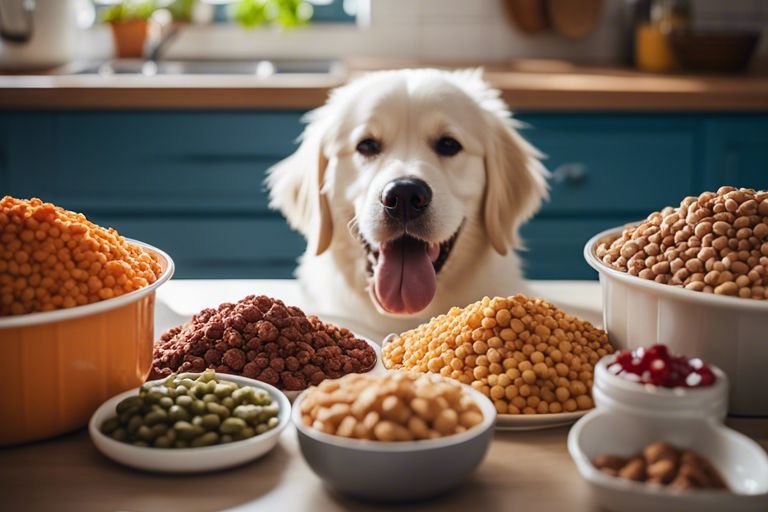
Top 10 Dog Food Additives
Omega-3 Fatty Acids for Healthy Skin and Coat
Now, let’s probe into some key additives that can enhance your pet’s nutrition. Starting with these necessary fatty acids play a crucial role in maintaining your dog’s skin and coat health.
Skin and coat issues are common among dogs, and incorporating omega-3 fatty acids into their diet can help alleviate these problems. Omega-3s are known to reduce inflammation, improve skin conditions, and promote a shiny, lustrous coat. Foods rich in omega-3 fatty acids include fish oil, flaxseed, and salmon.
Probiotics for a Balanced Gut
The health of your dog’s gut directly impacts their overall well-being. Probiotics are beneficial bacteria that promote a healthy digestive system by aiding in nutrient absorption and supporting the immune system. Adding probiotics to your dog’s diet can help maintain a balanced gut flora and alleviate digestive issues such as bloating, gas, and diarrhea.
The use of probiotics is necessary in ensuring that your pet’s digestive system is running smoothly. Adding these beneficial bacteria to their food can provide numerous health benefits, including improved digestion and nutrient absorption. Look for dog foods that contain probiotics or opt for supplements to support your furry friend’s gut health.
Glucosamine and Chondroitin for Joint Health
Glucosamine and Chondroitin for Joint Health are important additives to support your dog’s joint health. Any dog owner knows the importance of keeping their furry friend’s joints healthy, especially as they age. Glucosamine and chondroitin are necessary building blocks for joint cartilage and can help improve mobility, reduce joint pain, and prevent conditions like arthritis. These additives are particularly beneficial for senior dogs or breeds prone to joint issues.
Antioxidants for Immune System Support
Antioxidants are crucial for your pet’s overall health. Omega-3 fatty acids, vitamin E, and other antioxidants can help boost your dog’s immune system, protect against cell damage, and reduce the risk of chronic diseases. Incorporating foods rich in antioxidants, such as blueberries, spinach, and carrots, can provide an extra layer of defense for your pet’s well-being.
Vitamin E for Healthy Muscles and Skin
Fatty acids like vitamin E are vital for maintaining healthy muscles, skin, and coat. Vitamin E acts as a powerful antioxidant, protecting cells from damage and supporting your dog’s overall health. Including vitamin E-rich foods like sunflower seeds, almonds, and spinach in your dog’s diet can help promote strong muscles and a shiny, healthy coat.
Dog Food additives play a significant role in enhancing your pet’snutrition and overall health. By incorporating these top 10 additives into your pet’s diet, you can provide them with necessary nutrients and support their well-being for years to come.
Additives for Specific Health Needs
Digestive Enzymes for Dogs with Food Sensitivities
Health: If your furry friend struggles with food sensitivities or digestive issues, adding digestive enzymes to their diet can be highly beneficial. These enzymes help break down food more effectively, reducing the strain on your dog’s digestive system. By aiding in the digestion process, digestive enzymes can alleviate discomfort and promote better nutrient absorption, leading to improved overall health.
Prebiotics for Supporting Gut Health
Sensitivities: Incorporating prebiotics into your dog’s diet can be a game-changer for their gut health. Prebiotics are non-digestible fibers that serve as food for the beneficial bacteria in your dog’s digestive tract, promoting a healthy balance of gut microbiota. This, in turn, can boost digestion, strengthen the immune system, and improve nutrient absorption. Overall, prebiotics play a vital role in maintaining your pet’s overall digestive wellness.
Specific: When opting for prebiotic supplements for your dog, look for ingredients like chicory root, chicory inulin, or fructooligosaccharides (FOS) on the label. These types of prebiotics are known for their ability to selectively feed beneficial bacteria in the gut, enhancing your dog’s overall digestion and well-being.
Turmeric/Curcumin for Anti-Inflammatory Benefits
Prebiotics: Turmeric, specifically its active compound curcumin, is a powerful ingredient known for its anti-inflammatory properties. Adding turmeric or curcumin supplements to your dog’s diet can help reduce inflammation, making it beneficial for dogs with arthritis, joint pain, or other inflammatory conditions. By incorporating this natural additive, you can support your dog’s joint health and overall well-being.
Dogs: When choosing a turmeric or curcumin supplement for your dog, opt for products specifically formulated for pets to ensure the dosage is safe and effective. Consult with your veterinarian to determine the appropriate dosage based on your dog’s specific health needs and condition.

How to Choose the Right Additives
Researching and Selecting High-Quality Additives
Keep in mind that not all dog food additives are created equal. When selecting additives to enhance your pet’s nutrition, it’s imperative to research and choose high-quality options. Look for additives that are made from natural ingredients and free from artificial colors, flavors, and preservatives. Reading reviews and checking for third-party certifications can help you ensure that you are selecting the best additives for your dog.
Consulting with Your Veterinarian
Right before adding any new supplements or additives to your dog’s diet, it’s important to consult with your veterinarian. Your vet knows your dog’s health history and can provide guidance on which additives may be beneficial and which ones to avoid based on your pet’s individual needs. They can also help you determine the right dosage and frequency of the additives to ensure your dog’s safety and well-being.
With their expertise, veterinarians can help you navigate the complex world of dog food additives and make informed decisions that best suit your pet’s unique dietary requirements. By working closely with your vet, you can create a well-rounded nutrition plan that incorporates the right additives to support your dog’s overall health and vitality.
Another vital aspect of consulting with your veterinarian is to monitor your dog’s response to the new additives. Your vet can advise you on what signs to look out for that may indicate an adverse reaction or sensitivity to a specific additive. Regular check-ins with your veterinarian can help ensure that the additives you choose continue to benefit your dog’s health without causing any negative effects.
Precautions and Considerations
Many factors need to be considered when adding supplements to your dog’s diet to ensure their safety and effectiveness. It’s crucial to be cautious and aware of potential interactions with medications and any allergic reactions or sensitivities your pet may have.
Potential Interactions with Medications
One important consideration when adding dog food additives to your pet’s diet is the potential for interactions with any medications they may be taking. Some supplements can interfere with certain medications, affecting their absorption or potency. Always consult with your veterinarian before introducing any new additives to ensure they are safe to use alongside your pet’s medication regimen.
Allergic Reactions and Sensitivities
On the topic of allergic reactions and sensitivities, it’s crucial to monitor your dog closely after introducing any new additives to their food. Keep an eye out for any signs of an allergic reaction, such as itching, hives, or digestive upset. If you notice any concerning symptoms, discontinue use immediately and consult your vet for further guidance.
With careful consideration and monitoring, you can safely enhance your dog’s nutrition with food additives, ensuring they receive the best possible dietary support for their overall health and well-being.
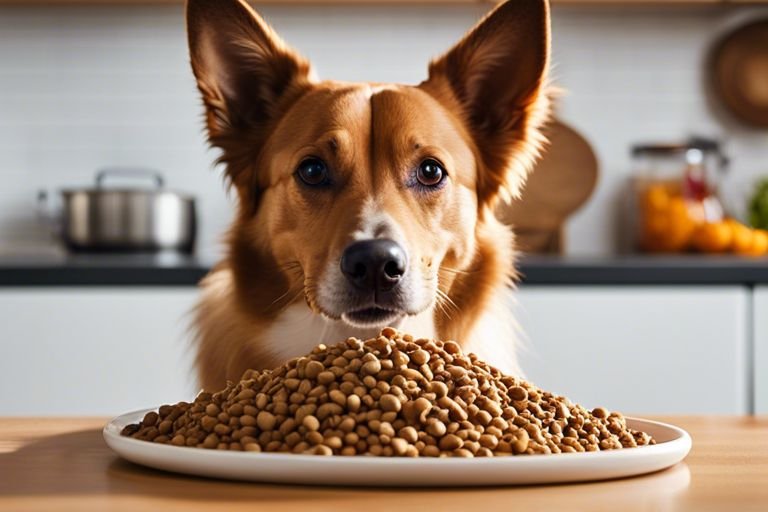
Incorporating Additives into Your Dog's Diet
One important aspect to consider when adding supplements to your dog’s diet is to introduce them gradually. Sudden changes in your pet’s food can lead to digestive upset and discomfort. To avoid this, start by incorporating small amounts of the additive into your dog’s meals and gradually increasing the dosage over a period of several days. This gentle introduction allows your pet’s digestive system to adjust to the new supplement without causing any adverse reactions.
Gradual Introduction to Prevent Digestive Upset
It is crucial to monitor your dog’s reactions during this transition period. Keep an eye out for any signs of gastrointestinal distress such as diarrhea, vomiting, or changes in appetite. If you notice any negative symptoms, it’s best to consult with your veterinarian and adjust the dosage accordingly.
Measuring and Mixing Additives Correctly
To ensure the proper dosage of additives, it’s crucial to accurately measure and mix them into your dog’s food. Use a measuring spoon or cup specifically designed for pet supplements to avoid under or overdosing. Thoroughly mix the supplement into your pet’s food to ensure even distribution and to prevent your dog from picking out the additive and refusing to eat the rest of the meal.
Your dog’s well-being is of utmost importance when incorporating additives into their diet. By following these simple steps, you can enhance your pet’s nutrition without causing any digestive issues or mealtime challenges.
To wrap up
Now that you have learned about the top 10 dog food additives to enhance your pet’s nutrition, you can make more informed decisions when choosing the right food for your furry friend. By understanding the benefits of these additives, such as glucosamine for joint health or probiotics for gut health, you can help support your dog’s overall well-being.
Remember to always consult with your veterinarian before making any significant changes to your pet’s diet. With the right combination of high-quality ingredients and beneficial additives, you can ensure that your dog is getting the nutrition they need to live a happy and healthy life by your side.
FAQ
Q: What are dog food additives?
A: Dog food additives are supplemental ingredients added to your pet’s food to enhance their overall nutrition and health.
Q: Why should I consider using dog food additives?
A: Dog food additives can help address specific dietary needs, improve digestion, boost immune system, and promote overall well-being in your pet.
Q: Are dog food additives safe for my pet?
A: When used appropriately and in recommended doses, dog food additives are generally safe for pets. However, it’s important to consult with your veterinarian before adding any new supplements to your pet’s diet.
Q: Can dog food additives help with specific health conditions?
A: Yes, certain additives like omega-3 fatty acids can be beneficial for skin and coat health, glucosamine for joint support, and probiotics for digestive health.
Q: How do I choose the right dog food additives for my pet?
A: Consider your pet’s age, breed, size, and any specific health concerns they may have when selecting dog food additives. Consult with your vet to determine the best supplements for your pet’s individual needs.

